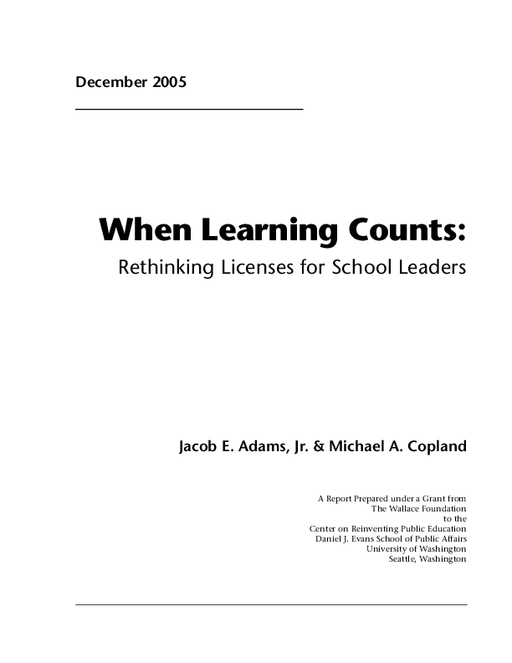Breadcrumb
- Wallace
- Reports
- When Learning Counts Rethinking ...
When Learning Counts
Rethinking Licenses for School Leaders

- Author(s)
- Jacob E. Adams, Jr. and Michael A. Copland
- Publisher(s)
- Center on Reinventing Public Education
Summary
How we did this
Researchers conducted a content analysis of the state administrative code sections that govern principal licensure. They examined licensure content for all 50 states plus the District of Columbia.
Do the licenses that states require of school principals encompass the knowledge and skills those principals need to promote student learning? If not, what kind of policy framework would help decisionmakers rethink principal licenses and the school leadership they support?
This report seeks to answer these questions. It concludes that licensing requirements for principals in most states are not focused enough on the skills school leaders need to improve learning.
- Licenses don't reflect a learning focus. No state has crafted licensing policies that reflect a coherent learning-focused school leadership agenda. Many rely on individual characteristics like background checks or academic degrees or on lists of knowledge and skill requirements.
- Licensing requirements are unbalanced across states and misaligned with today’s ambitions for school leaders. In addition to the variation in policy focus across individual, organizational, and learning content, licensing demands also vary in terms of numbers. For example, Hawaii has just one regulatory requirement while Arkansas has 435.
- Licenses form the foundation of school leadership development. Rethinking principal licenses is an important first step in promoting leadership for learning.
Doing licensure well begins by challenging traditional licenses. Asking questions such as does the license protect the public from harm? and does the license ensure fair access to the job? can help form a basis for affirming or altering the licenses that states enact.
Doing licensure well also requires a balanced framework that’s able to link licenses with the duties and demands of the principalship. The framework the authors came up with covers three categories: individual-focused elements such as personal character, organizational-focused elements such as technology utilization, and learning-focused elements such as knowledge and skills regarding education programs.
The authors call this framework Licensing-Plus, and it affects practitioners in four stages:
- It (re)structures the license itself to include a background check, academic degree, specification of required knowledge and skills, and a test of knowledge and skills that is open to all candidates regardless of background.
- It provides for the development of expertise through focused continuing education tied to required knowledge and skills; voluntary, post-licensure certifications in specialized areas of school leadership; and distributed leadership roles.
- It promotes leadership development through specialized leadership training that includes policy and professional opportunities.
- It promotes effective licensing policies by using research to align licensing provisions, principal knowledge and skills, and school performance.

In short, when student learning matters, states must view principal licenses as tools to promote learning.
Key Takeaways
- Licenses are an important policy tool. They help regulate who may become a principal, and they signal the qualifications the public may expect in its school leaders. However, licenses are not in sync with the demands of school leadership.
- Tackling new demands for school leadership requires that states rethink principal licenses in ways that move the profession toward the learning-focused school leadership the nation demands.
- The solution could be a balanced framework that's able to link licenses with the duties of the principalship. The suggested framework by the authors covers three categories: individual-focused elements (like skill assessment), organizational-focused elements (like social performance), and learning-focused elements (like knowledge and skills regarding educational programs, students, teachers, schools, and community outreach).

